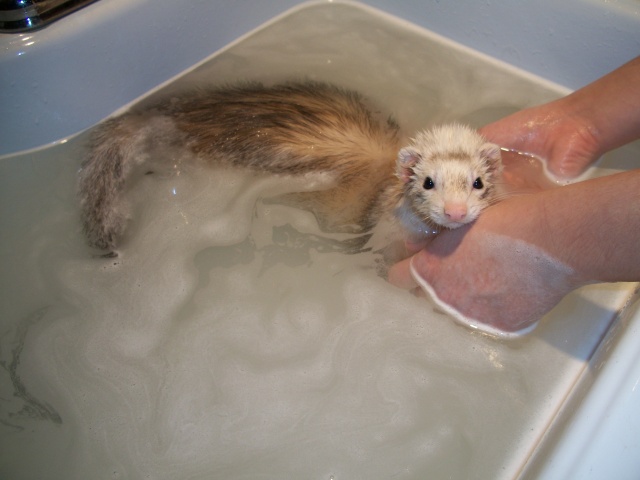QuestionHi, I've actually got a few questions for you.
I will be getting my first ferret in about a month and I just kind of wanted to
know about some of the basics in training and what they're like and a little bit
about ferret-proofing.
I live in an apartment, where everything is basically open except the bedroom
and bathroom. I plan on keeping both of those doors shut though when the
ferret is out. I'm most worried about my couches and refrigerater.
The couches have the skirt on the bottom, so you can't see underneath, but
would a ferret still be curious enough to push through those? And if so, what is
a simple way I could block it off?
There's no way I can shut the ferret out of my kitchen, so do you know any way I
could block the back of my refrigerater off?
I also have a dog. She's sort of small, only 20 pounds, but she loves to play.
She's part of the reason I decided to get the ferret. I think she would like the
company and this way she wouldn't need the constant attention directly from
me. Do you know the best way I could introduce the two of them?
And the question I have is what to look for when getting my ferret. I know I will
be getting it from a Petco, and they have all of their ferrets together, so is there
something I should look for in one that the others don't have? And is there a
difference between getting a male or female? Mostly I'm asking behavior wise,
but I've also read that the females don't smell as much as males.
AnswerHello Megan!
Thank you for being a concerned future-owner and doing your research. Ferrets are a big responsibility, just like a cat or a dog. They are not cage animals and need your attention and love daily (at least 4 hours). In return, they form incredibly close bonds with their owners by cuddling and showing affection. You will have yourself a devoted friend.
Ferrets make GREAT apartment pets for several reasons. They are generally quiet, and do not bark at strangers like dogs. They can readily be confined to a small cage while you are away, and surprising enough, their urine and feces smell much LESS than a cat's! (Have you ever smelt a cat's litter box? PHEW!)
There are also some challenges you will have. Ferrets are NOTORIOUS diggers, and it is in their blood to destroy carpet and such surfaces. No matter the amount of training and scolding, they will be at it the moment you look away! It is wise to place linoleum over any carpeted areas accessible to the ferret. Not only is it dig-proof, but it is easy to clean.
You will have to worry about your couch and refrigerator, and probably many more things! Your new ferret will be under, over, and all around your couch. This can be dangerous if you don't know he is under the cushions, so please be careful. He may also dig on it's surface and possibly single handedly destroy it entirely. Some ferrets are VERY destructive, while others are not. It completely depends on the personality and a bit of luck!
As far as the refrigerator, yes... you would have to completely seal off the back so he cannot squeeze through. This might be tricky. Stuffing blankets into the crack will not work. He will just pull them out. the best method would be to cut pieces of wood that fit between the wall and the refrigerator snuggly up to about 3 feet. As long as he cannot remove them or climb over, you should be ok.
Remember to ferret proof the rest of the house as well. Check any low areas for openings; such as under cabinets, the stove, wires, etc. Also look high as well. Ferrets can climb fairly well, and have a tendency to fall. This can be very dangerous. One time my girl climbed all of the way up a door from a hung robe. Imagine my surprise to find her at the top of the door staring down at me! Remember a lot of your ferret proofing will depend on your ferret. You will learn to know his quirks by observing him closely.
It is usually best to confine the ferret to a single room rather than the entire house. There are too many dangers, and it is best to watch your ferret closely when you DO let him roam. Perhaps a bathroom or a bed room? This way, he will have some freedom while not having access to the whole house. You can also set up a barrier at the door (usually thick Plexiglases cut to size). This will ensure he cannot escape while you are not looking!
Be very careful with introducing your dog to your new ferret. Although sometimes friendships DO exist between two species, they should NEVER be allowed to play alone. Remember, your dog outweighs the ferret by about 10x, so even play can be dangerous. Please watch them closely whenever they are allowed together.
As a side note, please be aware that ferrets require a special diet. Feeding poor quality food, carbohydrates or sugars have been linked to serious health problems such as insulinoma. Please refer to the link below. It is a previous question I have answered regarding the topic.
http://en.allexperts.com/q/Ferrets-2277/2008/9/Best-types-ferret-food.htm
When you are choosing your ferret, look for the traits you want in a pet. Is he or she pretty relaxed and chill, or hyper and playful? Do you want a male or a female? You will get an idea from meeting with the ferret about his or her unique personality. I recommend spending plenty of time before you make a decision.
Just a word of caution. Petco ferrets are fixed at a very young age, roughly 6 weeks old. It is thought that this practice causes a very much increased chance of adrenal and other diseases later in life. I am NOT a fan of this practice, and such diseases are not often seen in countries where they are altered at a later age.
Ok, so how can you avoid this? The first possibility is to do some research and locate a good breeder. There are places all over the country, and some DO ship kits. Personally, I would rather meet the breeder and ferret beforehand, but sometimes the nearest breeder may be 100s of miles away. I drove a total of 900 miles for my Scuzz, and I don't regret it! Unfortunately you won't find late-fixed ferrets in pet stores. If you do, you are lucky. Please ask where the pet store obtains the kits and if they were altered at a young age. I know Marshall farms and Path Valley both practice early spay and neutering.
There is a problem with finding a breeder. Since Marshall Farm's and other large facilities use artificial light to induce the breeding season, kits are available year round. A good breeder will NOT use this practice, and will have babies for sale only in June or July. There is a possibility that you can find an older ferret that was not sold over the summer if you want one sooner.
A second option is adoption. There are thousands of ferrets around the country that need loving homes. This way, you are not supporting large breeding facilities and the adoption fee will go to a good cause. Unfortunately, these ferrets are mostly from pet stores and DO have a higher chance of serious illness later in life. BUT, you are helping a ferret in need, and he or she will love you UNCONDITIONALLY. If you need help locating a shelter in your area, please let me know.
I am sorry this is so long, but I wanted to be as thorough as possible. If you need any assistance in locating shelters or breeders, or have any other questions please do not hesitate to ask. Best of luck in finding the perfect ferret! They really do make wonderful pets.
-Cindy P.

 Female Behavior Issues
QuestionQUESTION: I have had Ryoko, my female ferret, f
Female Behavior Issues
QuestionQUESTION: I have had Ryoko, my female ferret, f
 Piper
QuestionQUESTION: Hi, and thankyou for your quick respo
Piper
QuestionQUESTION: Hi, and thankyou for your quick respo
 ferrets jaw doesnt open far
Question
Rodney and Harry
I have a 2 year old ferret th
ferrets jaw doesnt open far
Question
Rodney and Harry
I have a 2 year old ferret th
 How do you think Isis is?
QuestionCookie and Isis :)
QUESTION: Hello. :)
How do you think Isis is?
QuestionCookie and Isis :)
QUESTION: Hello. :)
 Just some basic help questions
Question
Benny!
Hi!
My ferret Benito (we just call him
Just some basic help questions
Question
Benny!
Hi!
My ferret Benito (we just call him